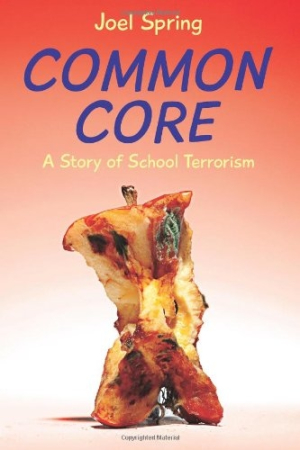Common Core
A Story of School Terrorism
Current trends in education are featured in this thought-provoking novel as a means to incite a call to arms for student-centered school reform.
America is expanding for-profit educational opportunities for students while moving away from “powerful” teachers’ unions and in the direction of more government involvement. The author of over twenty books about education, school reform, and globalization, Joel Spring is clearly writing about what he knows in this satire on the most current trends in American education. That includes a move to the Common Core, more standardized testing that will be used to determine school and teacher funding, and the shift to more “robotic” delivery systems of information, including online instruction.
Spring’s treatment of a fictional poisoning of the US secretary of education, a school bombing that is seemingly related to the changing of the answers on a standardized test, and the involvement of the FBI and Department of Homeland Security in the incident—fresh on the heels of the actual Boston Marathon bombing—all make his satire very timely. These references may serve to date the book quickly, however, as trends in education move quickly and current events are overtaken by new catastrophes.
In Common Core: A Story of School Terrorism, Spring makes an effort to explain nearly all aspects of the educational system, yet, even with this extra information, readers who are not familiar with the current trends may find it necessary to do extra research to clarify the terminology and premises.
The characters are all fairly static; each seems to be a caricature, including the Type A Homeland Security agent and the put-upon director of the charter school who is attempting, under the guise of helping young people, to circumvent the system and make some money. Even the teachers seem to be caricatures. As two of them sit changing answers on a standardized test, (so their charter school funding won’t be cut), they behave as if they really couldn’t care less about the students and are only interested in hanging on to their jobs.
Common Core is very readable. The story moves along at a fast pace, never bogged down with unnecessary details or dialogue. Satire provides a spark to the narrative by shining a light on other current events besides education reform. In the book, the group Hug Our Trees adds some verve to the storytelling with political antics such as causing a car accident by throwing pig fetuses at pro-life protesters outside an abortion clinic, or blinding someone when throwing condoms from airplanes to protest forced vaginal ultrasounds.
Spring’s “story of school terrorism” asks that Americans work harder to fairly educate all students and come up with more effective ways of delivering information to twenty-first-century students. No matter which side of the education debate readers may be, this satire adds spice to the conversation.
Reviewed by
Lynn Evarts
Disclosure: This article is not an endorsement, but a review. The publisher of this book provided free copies of the book and paid a small fee to have their book reviewed by a professional reviewer. Foreword Reviews and Clarion Reviews make no guarantee that the publisher will receive a positive review. Foreword Magazine, Inc. is disclosing this in accordance with the Federal Trade Commission’s 16 CFR, Part 255.


